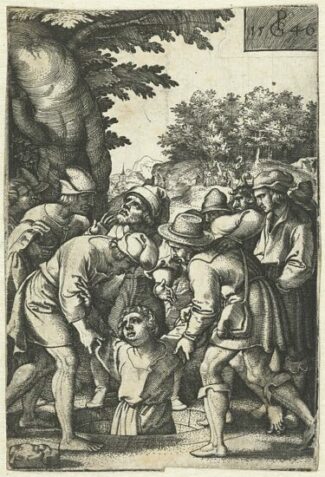
All Things Work Together for Good!
We Need Not Fear Anything That Opposes Us
It is easy for us in our day-to-day living to forget the care our heavenly Father has for us when we suddenly fall into some unpleasant trial, or when it seems that nothing is working right. We are God’s people living within a world filled with evil, for this is Satan’s world (II Corinthians 4:4; Ephesians 2:2). He would like nothing better than for us to fall prey to discouragement and hopelessness when things do not work out as we think they ought.
It is at such times that we need to reexamine a well-known Scripture that has such profound meaning and power. That is Romans 8:28. Several translations of this verse are given below.
“And we know that all things work together for good to those who love God, to those who are the called according to His purpose”(NKJV).
“And we know that to those loving God all things do work together for good to those who are called according to purpose”(Young’s Literal Translation).
“We know also that those who love God have His aid and interest in everything, those who have been called in terms of His purpose” (Moffatt).
“But we know that He helps those who loveGod in everything for good, those whom He preordained to be called” (Aramaic Bible in Plain English).
“And we know [with great confidence] that God [who is deeply concerned about us] causes all things to work together [as a plan] for good for those who love God, to those who are called according to his plan and purpose” [Amplified Bible].
all things = pas, “all, any, every, the whole.”
together = sunergeo, “to cooperate, be a fellow worker or co-laborer.”
love= agapao, “to love, in a moral, Godly sense.”
called = kletos, “invited, appointed.”
purpose= prothesis, “a setting forth or proposal.”

These translations all agree in that those whom the Father has called, or predestined for salvation (John 6:44; Romans 8:29-30; Ephesians 1:3-11),have a promise from the Creator that everything in their lives works out in a pattern for good. There is no equivocation on this promise. It is sure, and highly prophetic, yet a promise that is surprisingly extant throughout God’s word. Note the several Scriptural references below to emphasize this point.
“My brethren, count it all joy when you fall into various trials, knowing that the testing of your faith produces patience. But let patience have its perfect work, that you maybe perfect and complete, lacking nothing”(James 1:2-4).
“But as for you, you meant evil against me [Joseph]; but God meant it for good, in order to bring it about as it is this day, to save many people alive” (Genesis 50:20).
“In Him also we have obtained an inheritance, being predestined according to the purpose of Him who works all things according to the counsel of His will” (Ephesians 1:11).
“No temptation has overtaken you except such as is common to man; but God is faithful, who will not allow you to be tempted beyond what you are able, but with the temptation will also make the way of escape, that you may be able to bear it” ( I Corinthians 10:13).
“Now He who searches the hearts knows that the mind of the spirit is, because it makes intercession for the saints according to the will of God” (Romans 8:27).
“But may the God of all grace who called us to His eternal glory by Christ Jesus, after you have suffered a while, perfect, establish, strengthen, and settle you” (I Peter5:10).
“For I know the thoughts that I think toward you, says the Lord, thoughts of peace and not of evil, to give you a future and a hope” (Jeremiah 29:11).
“Now may the God of peace Himself sanctify you completely; and may your whole spirit, soul, and body be preserved blameless at the coming of our Lord Jesus Christ.He who calls you is faithful, who also will do it” (II Thessalonians 5:23-24).
“For I consider that the sufferings of this present time are not worthy to be compared with the glory which shall be revealed in us” (Romans 8:18)
Notice that several of the above Scriptures relate suffering to our calling. It is this “working together for good” through suffering that is being emphasized in Romans 8:28, even if we think that we are being plagued and forsaken for no good reason. We can beassured that even through calamities, the end resultover time is for good (I Peter 4:22; Ephesians 6:16).
Biblical Examples
Throughout Scripture we see instances of “allthings working together for good.” Let us review afew of them.
Joseph.The favorite son of Jacob was hated by his brothers for his dreams of being the head over them. They plotted to kill him, but sold him instead to Ishmaelite traders, who took him to Egypt and sold him to Potiphar, an officer of Pharoah. He became known as a trusted and industrious keeper of Potiphar’s household, but was framed by Potiphar’s wife for attempted rape, and thrown into the king’s prison.After two years there — proving himself to be worthy of charge over the other prisoners — he interpreted the dreams of the butler and baker, and eventually was brought before Pharaoh himself to interpret the dream predicting the seven years of plenty followed by seven years of drought. He became second in power within Egypt; only Pharaoh himself was greater. Eventually, through a series of events during a drought period, he arranged for the relocation of Jacob and his other 11 sons to Egypt. The apparent disastrous events of being sold as a slave, unjustly accused and put into prison in a foreign land, and separated from his father ended up being for much good … so much good that the forerunners of the nation of Israel were preserved, and the promises given by Yahweh to Abraham, Isaac, and Jacob could be fulfilled. Read the story in Genesis 37, and 39 to 50.
Israel (the nation). The Israelites conquered the land of Canaan and its tribes, as instructed by Yahweh, and settled the land and began to multiply. They were blessed on every side, destroying city after city in the land and slaughtering the in habitants, for Yahweh had warned them about intermarrying with the people and worshipping their idols. Just before Joshua died he gave the nation a solemn warning:
“Therefore it shall come to pass, that as all the good things have come upon you which the Lord your God promised you, so the Lord will bring upon you all harmful things, until He has destroyed you from this good land which the Lord your God has given you. When you have transgressed the covenant of the Lord your God, which He commanded you, and have gone and served other gods, and bowed down to them, then the anger of the Lord will burn against you, and you shall perish quickly from the good land which He has given you” (Joshua23:15-16).
Israel and Judah did indeed transgress God’s covenant, and endured countless trials during the period of the judges, and on through the reign of the kings of both nations until finally Israel, and then Judah, were taken captive by Assyrian and Babylon, respectively.
Some might say that this captivity was the final nail in the coffin for the people, and they essentially disappeared from history; God’s promises to Abraham — of a great people and the Savior Himself coming from him (Genesis 12:1-3; 17:1-8) — and the prophesies of the individual tribes of “… what shall befall you [the 12 tribes\ in the last days” (Genesis 49:1), were obliterated. Yet, we know that God’s promises are sure, and that there was a critical reason for the Israel’s and Judah’s captivity. Had the people not been moved out of the land of Canaan to the provinces of Assyria and Babylon, the nations of Israel and Judah would have been absorbed into the Canaanite nations through intermarriage with the Hivites, Jebusites, Perizzites, Hittites, Girgashites, and other idolatrous peoples. They would have ceased to exist, and God’s promises to Abraham,Isaac, and Jacob could not have been fulfilled. However by bringing His people out of that toxic environment in Canaan into which they has descended, the people were able to retain their identity and repent of their idolatries, just as God said.
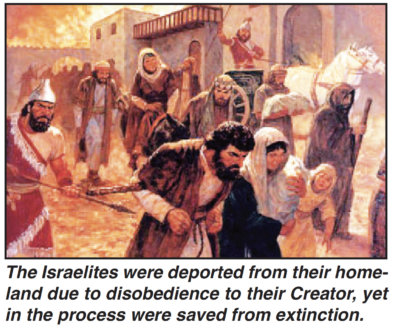
“…If you are unfaithful, I will scatter you among the nations, but if you return to Me, and keep My commandments and do them, though some of you were cast out to the farthest part of the heavens, yet I will gather them from there, and bring them to the place which I have chosen as a dwelling for My name” (Nehemiah 1:8-9).
To preserve His people and fulfill His promise,Israel was taken captive and brought to Mesopotamia, where the people maintained their identities, eventually migrated into eastern and western Europe, and later to North and South America, Australia, New Zealand, and other countries where they now constitute the Anglo-Saxon peoples. All things have worked together for good for Israel despite their failure to adhere to the commandments of God. In their calamity, God averted their annihilation in spite of themselves.
Paul (the apostle). What incredible trials this man of God had to endure in order to fulfill God’s will for him. In spite of being a totally dedicated servant of his Creator, he bluntly admitted his ongoing struggle with sin in the flesh.
“For I know that in me (that is, in my flesh) nothing good dwells; for to will is present with me, but how to perform what is good I do not find. For the good that I will to do, I do not do; but the evil I will not to do, that I practice …. For I delight in the law of God according to the inward man. But I see another law in my members warring against the law of my mind, and bringing me into captivity to the law of sin which is in my members. O wretched man that I am! Who will deliver me from this body of death?” (Romans 7:18-19, 22-24).
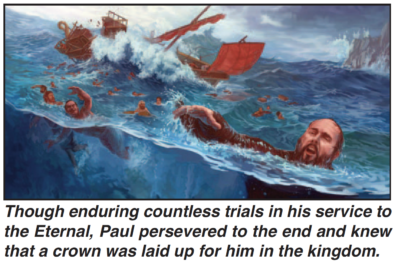
Yet, in this same letter to the Romans, Paul stated that “all things work together for good,” this in spite of his admitted shortfall from perfection. Notice all of the trials Paul had to endure for his calling, which would have stopped any normal person without God’s spirit from completing his commission (IICorinthians 11:23-28).
- Put in prison many times
- Flogged an uncounted number of times
- Faced death over and over
- Received 39 lashes from the Jews five times
- Beaten with rods three times
- Stoned one time
- Shipwrecked three times
- Spent a day and night in the sea
- In continual danger from waters and robbers
- In danger from his own countrymen, as well as from the gentiles
- In danger in the city, in the country, at sea, and from false brethren
- Weary and in pain often, without sleep
- Often hungry and thirsty, cold and naked
- Continually concerned about the health of all the congregations
When stoned and left for dead in Lystra, he miraculously rose up and was on his journey with Barnabas the next day (Acts 14:19-20). Some think he experienced his heavenly vision when he had been stoned (II Corinthians 12:7), which resulted in yet another trial: a thorn in the flesh, “… a messenger of Satan to buffet me …” so he would not be lifted up in pride from having seen such incredible visions (IICorinthians 12:7).
Despite these trials, Paul understood that everything he had experienced was for good, working within a pattern that prepared him for his future responsibilities in Rome, and ultimately for his place in the Kingdom of God … for he stated,
“I have fought the good fight, I have finished the race, I have kept the faith. Finally there is laid up for me the crown of righteousness, which the Lord, the righteous Judge, will give me on that Day, and not to me only but also to all who have loved His appearing” (II Timothy 4:7-8).
Moses. Look at all of the troubles that this servant of Elohim had to endure during his life. Yet, through all of them he understood that everything worked together in a pattern for good, though he was oftentimes pushed to the limit of his tolerance of life itself. Three times he had to reason with God to not have all of Israel destroyed because of their complaining (Exodus 32:9-10; Numbers 14:12; 16:21).Notice the following trials that he had to endure.
- Pharaoh sought to kill him, and he fled Egypt for Midian (Exodus 2:15).
- He experienced some sort of speech impediment (Exodus 4:10-17).
- When he failed to circumcise his son, God threatened his life (Exodus 4:24-26).
- Oftentimes the Israelites grumbled against him and Yahweh (Exodus 14:10-12; 15:22-25;16:2-3; 17:2-4; Numbers 11:4-6; 14:1-4; 16:41-42; 20:2-5; 21:4-5). After one especially difficult impasse, Moses asked Yahweh to kill him (Numbers 11:14-16).
- Aaron and Miriam criticized him for having married an Ethiopian woman, and then attacked his leadership (Numbers 12:1-2).
- His leadership was challenged by Korah, Dathan, Abiram, On, and 250 other leaders (Numbers 16:1-40).
- After leading Israel for 40 years through the wilderness, he was denied entry into Canaan because of his infraction of striking the rock at Meribah to get water, rather than speaking to it (Numbers 20:12-14; 27:12-14; Deuteronomy3:23-28).

Old Testament prophets. They could all belisted here, but only afew will be discussed.
Ezekiel. He was confined to his house and not able to speak until allowed by God (Ezekiel 3:25-26), he had to lay on his left side for 390 days, and then on his right side for 40 days (Ezekiel 4:4-6), he cooked his food with animal dung after pleading with God that he not use human dung (Ezekiel 4:12-15), and Yahweh said his wife would die, but he was not to mourn or weep for her (Ezekiel24:14-18).
Isaiah. He was told to walk naked for three years (Isaiah 20:3), and according to tradition he was sawn in two while hiding in a hollow log during Manassah’s reign (possibly alluded to in Hebrews11:37).
Jeremiah. Jeremiah was forbidden to marry (Jeremiah 16:2), was persecuted so severely that we wished he had never been born (Jeremiah 20:14-18),was beaten and imprisoned (Jeremiah 37:15-16), and cast into a cistern and left to die (Jeremiah 38:6).
Jonah. He was cast into the sea, swallowed by a huge fish, and after three days and nights was vomited onto dry land so he could carry out his mission to Nineveh (Jonah 1:15-17; 2: 3:1-3).
Hosea. Yahweh told him to marry a prostitute who would then commit adultery; after that, he was to retrieve her from the man she had cohabited with (Hosea 3:1-5).
Elijah. Jezebel sought to kill him, and at Mount Horeb he was so dejected that he asked God to kill him (I Kings 19:14).
Daniel. This servant of Yahweh refused to worship or petition King Darius, but prayed as he always did three times a day, resulting in being thrown into the lion’s den (Daniel 6).
All of these prophets endured circumstances that would cause most people to give up and terminate their commission. Yet, all of them persevered through their trials, clinging to the promise stated centuries later by Paul that God would not tempt them beyond what they were ale to endure, but would always provide a way of escape so they could bear through any trial (I Corinthians 10:13).
The man blind from birth. In John 9:1-7 we read of a man who was born blind. Then Jesus’ disciples asked the question, “… who sinned, this manor his parents, that he was born blind?” Jesus made it plain that neither the man nor his parents sinned, but “… that the works of God should be revealed in him.” Jesus then mixed saliva with some clay, applied it to the man’s eyes, and instructed him to washin the pool of Siloam. When he did his vision was healed. Despite the depressing circumstance of being born blind, and the effect that had on his life, his meet-up with Christ had been appointed from birth to display to many in Israel that the Father does indeed heal. A dismal start to life was turned into good.
Personal Examples
I could expound upon many, many true-life examples of people who have experienced trials that seem to indicate that our calamities are not for some ultimate and great purpose. Without trying to draw attention to myself, allow me to mention some situations I have personally faced, for these examples vividly show how disastrous situations work for good.
A quest to farm. Ever since I was young I have sought to be a farmer. It has been a first love implanted into my being. Growing up on a dairy farm in southwestern Minnesota, with a beautiful river valley running through it, and working alongside my parents and uncles with the crops and livestock, I left the farm after high school to pursue a university education on the advice of my dad: “Get an education first, and then, if you still want to farm, you can comeback.” I took him at his word, and got a bachelor’s degree in soils, then a Master’s Degree in soil fertility, after which I returned to the home area to farm with dad. My wife and I had just recently been baptized into the faith, had a year-old son, and were zealous to plant crops on my uncle’s land that adjoined the home farm. It was a dream come true … or so we thought.
The crops that year (1971) were excellent, but relations with my father had begun to deteriorate with my family’s keeping the Sabbath and Holy Days. The really serious conflict came when I announced that we were heading to the Feast of Tabernacles in Missouri, just as the corn harvest was beginning. Such a decision to leave a mature crop in the field because of a religious festival was viewed as absurd and fool hardy, but we stood our ground and kept the Feast.On our return my dad had already begun harvesting my corn, and I bore the brunt of much scorn from the family. I knew the weather would hold even though harvest would be delayed, but our solid faith did not impress my dad.
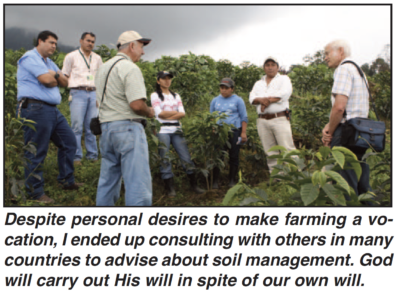
The situation grew progressively worse between our family and my parents, and the community as a whole. During that winter our funds totally dried up,and we were forced to leave the home farm for Ambassador College. It was very hard to discover that my father was more concerned with how others in the community felt about himself than he felt about his own son. For two years I attended Ambassador College, but finding that institution too steeped in the traditions of men, our family returned to the north, this time to a farm in Wisconsin as a farm manager. The call to tend the land was as strong as ever. However, after three years and broken promises by the owner, I headed with the family — now with three children — to Fargo, North Dakota, to work on a doctor’s degree. That degree was achieved, and yet the desire to farm persisted. However, no doors opened, and we returned to Texas where I became involved in international consulting, advising farmers in over 60 countries on the basics of natural, Godly farming methods. That effort has transpired over 32 years and has yet to end. Through the pains and frustrations of many years of failing to make farming work as a vocation, the Eternal smiled at my own efforts but brought about His will to be done. He made all things work for good, allowing a lowly servant of his to travel the world and spread the good news of better ways to treat the land, something I could never have accomplished had I remained on the home farm. Besides that, He has granted us a small farm and spiritual brethren that more than make up for the loss of our physical family.
“Assuredly I say to you, there is no one who has left house or brothers or sisters or father or mother or wife or children or lands, for My sake and the gospel’s, who shall not receive a hundred fold now in this time —houses and brothers and sisters and mothers and children and lands, with persecutions— and in the age to come, eternal life” (Mark 10:29-30).
Without a disruption of my initial plans and deep-seated desires, God could never have brought about His will to be done … and I have never lost the desire to farm. Now I understand that farming must be undertaken in accordance with God’s laws, not by man’s laws of corporate greed.
The loss of a child. My wife and I were expecting our seventh child. The first six had been born healthy and normal, but there was something different about this one. He moved within my wife, but notin the usual way. Then, at seven months my wife went into labor. The beautiful baby boy was born big enough to survive, but with severe hydrops, a condition caused by Rh blood incompatibility. My wife, being Rh negative and without receiving the Rhogram shot after the last few births, had built up antibody levels that the child could not endure, and his brain function was severely affected. Within a few minutes after birth he died.
It is impossible to describe the loss of a child, even a child who has not experienced life outside the womb. Many mothers have experienced such a loss, and it hurts deeply … and the hurt is never entirely forgotten. How, then, can such a loss of a human being made in God’s image work together for good?
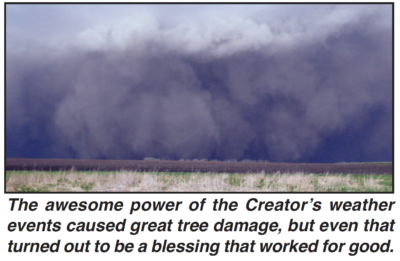
The word of God speaks of a second resurrection after the thousand years have passed. “Then I saw a great white throne and Him who sat on it, from whose face the earth and the heaven fled away ….”(Revelation 20:11). The following verses speak of the dead, small and great, standing before God. These are the people who never had a calling and opportunity to live life as we have, whose lives were cut short due to war, disease, accident, abortion, or stillbirth before receiving the truth of God’s plan, and being able to live and choose to follow His marvelous pathway to eternal life. No person will be forgotten by the Maker of all who live. Everyone who has been given life will receive a chance to live in the flesh again and chose eternal life, for He “… desires all men to be saved and come to the knowledge of the truth” (I Timothy 2:4).
Perhaps the Eternal knew that this little boy would experience hardships beyond his capability to endure were he to live in this age. In the end, though we grieve this loss today, I believe he will be among the elect who will enjoy eternal life along with the rest of us, just as will the myriads of others who never had the opportunity to live a full life and be called. All things will work for good; we just must be patient to realize that new beginning. I believe this little boy will be raised as a complete, mature man, as will be the case for any child whose life was cut short.
Trees destroyed by a storm. A row of five beautiful spruce trees adorned the front of our homestead. Supple and lovely they were, providing delight to the senses and wind protection from the south. They were getting a bit beyond their prime, however, with lower branches in some places becoming partially barren. Several years ago, having some extra trees from a windbreak planting, I had for some reason chosen to plant five of these small spruce just inside the established row.
On June 12, 2022, a tremendous windstorm struck the area with over 100 mph winds. Though sparing the house, the spruce trees succumbed. All but one were pushed over or snapped in two. Our beautiful spruce were now a row of destruction, which were dragged away, leaving the front of our homestead bare except for the row of five small spruce.
All things work together for good. Though they had still been stately and beautiful, the big spruce had passed their prime and the Eternal, through a devastating windstorm, decided for us the time to replace them. Indeed, He had inspired me to plant their replacements eight years before! In time these small trees will grow to stately eminence, and once again the homestead will have a glorious row of spruce …and more than that, a row of cotoneasters that have been planted in front of the spruce.
The story is not yet finished. Another huge spruce back of our house also toppled over during this furious May 12 storm. Its absence left a gaping hole in our landscape … but at the same time it opened a space to plant a special tree that my mother had asked me to plant before she died three years ago. That was a Pagoda dogwood tree, and I have been pondering where I might place it. God answered that need, and it stands exactly where the stately spruce tree used to stand.
How Do We Understand Romans 8:28?
Romans 8:28 is designed only for the elect, for it declares that “all things work together for good to those who love God….” You cannot love God unless you possess His spirit, which is given at baptism and the laying on of hands (Acts 2:38; 8:17-19); you are not His disciple unless you possess that spirit (Romans 8:9). In summary, then, what is this Scripture telling us?

1. This Scripture does not mean that the things we want are the things we should get. You may wish for wealth, honor, and notoriety in this world, but that which is great in this world is likely scorned by God.
“Do not love the world or the things in the world. If anyone loves the world, the love of the Father is not in him” (I John 2:15).
“And do not be conformed to the world, but be transformed by the renewing of your mind, that you may prove what is that good and acceptable and perfect will of God” (Romans 12:2).
“For you see your calling brethren, that not many wise according to the flesh, not many mighty, not many noble are called, but God has chosen the foolish things of the world to put to shame the wise, and God has chosen the weak things of the world to putto shame the things which are mighty; and the base things of the world and the things which are despised God has chosen; and the things which are not, to bring to nothing the things that are, that no flesh should glory in His presence” (I Corinthians 1:26-29).
If you get the things you ask for of this world,you will likely regret them unless those things conform with God’s will. We must seek to do the Father’s will, even as Jesus did (John 5:30), and walk in His footsteps (I John 2:6). Recall that “He who trusts in his riches will fall, but the righteous will flourish like foliage”(Proverbs 11:28).
2. God’s purposes for us will prevail, to build us up intoHis character. He has given us His spirit, which is a spirit of power, love, and a sound mind (II Timothy 1:7), that contains the qualities of love, joy, peace, patience, kindness, goodness, faithfulness, gentleness, and self control (Galatians 5:22). The verses following Romans 8:28 prove that He fore knew and predestined us to braised as spirit in Christ’s very image, as revealed also in Ephesians 1:3-11; we were known from before the founding of the earth! He has knowledge of the very end of times, and declares from ancient times things that are yet to occur (Isaiah 46:10).
Through various trials, God builds into us thecharacter He desires.
“In this you greatly rejoice, though now fora little while, if need be, you have been grieved by various trials, that the genuineness of your faith, being much more precious than gold that perishes, though it is tested by fire, may be found to praise, honor, and glory at the revelation of Jesus Christ …” (I Peter 1:6-7).
“My brethren, count it all joy when you falling to various trials, knowing that the testing of your faith produces patience” (James 1:2-3).
Note how Job suffered through incredible trials: painful boils, and the loss of his wealth and children.He was so depressed about his depraved circumstances that he wished he had never been born, and in his misery longed for death (Job 3). Yet, after being severely afflicted for a time he finally understood the lesson the Eternal was teaching him: “I have heard of you by the hearing of the ear, but now my eyes see You. Therefore I abhor myself, and repent in dust and ashes” (Job 42:5-6). Job was given twice as much wealth as he had previously received.This is how, for him, all things worked together for good, a man whose love for his Creator deepened by his suffering, all according to God’s eternal purpose.
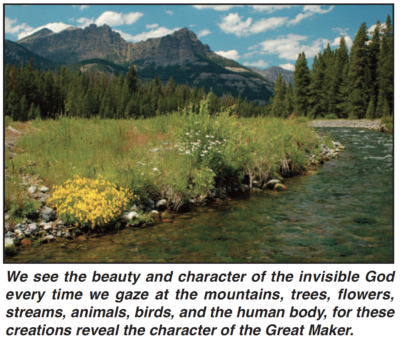
3. In spite of severe trials that God may give us, all things work for the best. Our heavenly Father isin total control of our lives. He knows exactly what stress needs to be placed upon us so we will change our behavior to please Him … to root us out of our past sins and into the character of His Son. Notice the first part of Romans 8. The carnal mind is contrasted to the spiritual mind, and those who love their Creator will put away the thoughts and works of the carnal flesh. Our heavenly Father wants us in his eternal spiritual realm, so He works tirelessly to move us toward spiritual-mindedness, which is “…life and peace” (Romans 8:6).
4. The goal of God’s plan is to bring us into His kingdom. That plan includes subjecting us to trials and suffering in the process of all things working together for good. Paul makes this clear in Romans 8:18-19 and 21.
“For I consider that the sufferings of the present time are not worthy to be compared with the glory which shall be revealed in us. For the earnest expectation of the creation eagerly waits for the revealing of the sons of God … because the creation itself also will be delivered from the bondage of corruption into the glorious liberty of the children of God.”
The “things” working together for good include these sufferings, which are a consequence of our loving the Creator, in order that His purpose of bringing us into the first resurrection might be fulfilled. Even if things seem “bad” from our perspective, they are very good from His perspective.
5. We need to keep focused on the unseen things of God in the process of all things working together for good. As we see in Romans 8:24 and 25, it is this hope of things that are not seen which drives us forward in maintaining our focus on this glorious future on ahead as spirits, through the groans, labors, and birth pangs while living in this present age (Romans 8:20-25). For this very reason Paul stated,
“Brethren, I do no count myself to have apprehended; but one thing I do, forgetting those things which are behind and reaching forward to those things which area head, I press toward the goal for the prize of the upward call of God in Christ Jesus” (Philippians 3:13-14).
Yet, even with this forward-looking view of life Paul stated a few verses later that, “… in whatever state I am, to be content” (Philippians 4:11; see alsoI Timothy 6:8 and Hebrews 13:5). He also made clear that we are not to “… look at the things which are seen, but at the things which are not seen. For the things which are seen are temporary, but the things which are not seen are eternal” (II Corinthians 4:18). We walk by faith, not by sight (II Corinthians 5:7).
Romans 8:28 is designed to encourage us to befaithful to God to the end of our days. In the end, He trumps everything that comes against Himself or us, and Paul’s words make this plain in the words that follow this much quoted verse. Our heavenly Father’s utmost concern is for us and our future. It is concern through our love for Him, and His love for us. As stated in Romans 8:35-39,
“Who shall separate us from the love of Christ? Shall tribulation, or distress, or persecution, or famine, or nakedness, or peril, or sword? As it is written, ‘For Your sake we are killed all day long; we are accounted as sheep for the slaughter.’ Yet inall these things we are more than conquerors through Him who loved us. For I am persuaded that neither death nor life, nor angels nor principalities nor powers, northings present nor things to come, nor height nor depth, nor any other created thing, shall be able to separate us from the love of God which is in Christ Jesus our Lord.”

